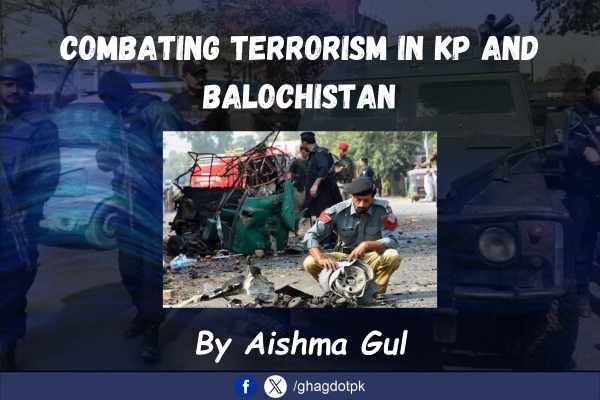By Aishma Gul
“The cost of freedom is high, but it’s a price the brave are willing to pay.” Pakistan’s security forces have embodied this spirit, defending the nation against terrorism. In recent weeks, Pakistan’s Khyber Pakhtunkhwa (KP) and Balochistan regions have witnessed a series of fierce confrontations between security forces and terrorists. These clashes underscore the ongoing struggle to maintain stability in areas long affected by insurgency and extremism.
Attacks on Security Personnel
On October 4-5, an intense exchange of fire erupted in North Waziristan’s Spinh Wam, resulting in the martyrdom of Lieutenant Colonel Muhammad Ali Shaukat and five soldiers, while six terrorists were neutralized. According to the Pakistan Army’s Public Relations Department (ISPR), this operation reflects the unwavering commitment of the armed forces to protect the nation despite heavy losses. Prime Minister Shehbaz Sharif paid tribute, highlighting the soldiers’ sacrifice as pivotal to Pakistan’s security. In another brutal incident, ten Frontier Corps (FC) personnel were martyred and three injured in an assault on their checkpost in Dera Ismail Khan’s Darazinda area. The terrorists, operating under the cover of darkness, attacked the Zam Check Post, resulting in a fierce firefight. Among the martyrs were six individuals from South Waziristan and four from Karak, emphasising the human cost in the battle against extremism.
Targeting High-Value Terrorists
In a recent operation in Bajaur, security forces managed to eliminate nine terrorists, including two suicide bombers and a high-value target, Syed Muhammad, also known as Qureshi Ustad. This success underscores Pakistan’s resolve to root out individuals responsible for numerous attacks on civilians and security forces. Arms, ammunition, and explosives were also recovered, signalling a significant victory in counter-terrorism efforts. Operations have extended to Balochistan, where security forces in Zhob killed two terrorists, including a suicide bomber linked to attacks on government officials. The ISPR confirmed that these operations aim to safeguard citizens and dismantle terrorist networks across the province.
Community Resistance and Local Efforts
Beyond formal military operations, communities in Khyber Pakhtunkhwa are increasingly standing against terrorism. In Lakki Marwat, locals joined police forces in identifying and eliminating a terrorist facilitator, with residents pledging to reject any supporters of extremism. This reflects an essential shift towards community-based resistance, where civilians are determined to protect their lands alongside security forces. *Attacks on Civilians* Civilians have not been spared from these terror campaigns. In Balochistan’s Duki area, 19 coal miners were brutally killed, with attackers using heavy weaponry to target Pashtun labourers. Balochistan Chief Minister Sarfraz Bugti condemned the assault, accusing banned groups like Tehreek Taliban Pakistan and its allies of attempting to destabilise Pakistan by targeting “soft targets” such as labourers.
Foiled Attacks and Swift Responses
Security forces also foiled an attack on an FC checkpost in Zhob, killing two terrorists, including a suicide bomber responsible for prior attacks on officials. Havildar Jamshid Khan was martyred, highlighting the commitment of security personnel to neutralise threats swiftly. In Bannu, five terrorists in burqas attacked the District Police Headquarters, killing four officers. A prolonged gunfight followed, with security forces neutralising all terrorists. This marked the second major attack in Bannu this year, intensifying efforts to curb further violence.
Recent Successes in Swat and Tirah Operations in Swat’s Charbagh area led to the killing of two terrorists, including Attaullah alias Mehran, involved in several attacks, including one on foreign diplomats. This adds to recent successes in Tirah, Khyber district, where terrorists used quadcopters to threaten civilians and security forces. Continuous operations are underway to clear terrorist activity from these regions.
Toward Lasting Peace and Stability
The ongoing operations in KP and Balochistan represent both Pakistan’s resilience and the complex challenges it faces in counter-terrorism. While significant progress has been made, including the elimination of key militants and the disruption of terrorist networks, the cost remains high for the armed forces and civilians alike. As officials continue to work towards long-term solutions, a collaborative approach between military operations and community vigilance may prove crucial in the fight for stability.






